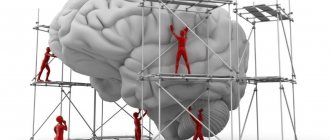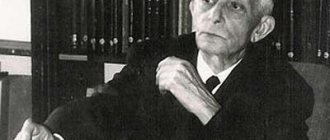The founder of Gestalt therapy, Frederick Perls, believed that there was no need to delve into memories and look for the causes of today's problems. Problems must be solved “here and now”. Interpretations of the causes of the disorder are of little use. It's better to fix them. In Gestalt therapy, the emphasis is on practice. A person must learn to solve his problems himself. Perls called the client’s independent work “experiments.” Here are some of them.
What would our body be worth if nature did not have protective mechanisms built into it? A trivial cut would never heal; the lightest breeze would cause a severe runny nose, putting us not to bed for three days, but to a completely different place and forever. But the cut heals, and a walk in windy weather does not end with a cold. At different levels, starting from the smallest cell, we are protected by nature from diseases and disorders.
In the same way, our psyche tries to correct mental problems on its own, without always informing us about it. This fully applies to worries, anxiety, and fears. The load on all systems of the body is so great that the psyche cannot stand aside and offers its own solutions to the problem, without waiting for our own attempts and the intervention of specialists.
Nature protects us with the fanaticism of a wasp, carrying food to the larvae walled up in honeycombs. At the same time, our defenses hide our problem from us. So analgin, dulling pain, promotes the development of an abscess. Our condition and behavior have long been outside the norm, but it seems to us that everything is fine.
The founder of Gestalt therapy, Frederick Perls, believed that there was no need to delve into childhood memories and look for the causes of today's problems. Problems must be solved “here and now.” The sources of many disorders are interrupted and unfinished actions, unsatisfied desires. A person can discover fragments of them in himself here and now, complete everything unfinished and move on.
Interpretations of the causes of the disorder are of little use. It's better to fix them. In Gestalt therapy, the emphasis is on practice. Moreover, self-use of various methods is encouraged. The client must learn to solve his problems himself, and not run with them to a psychotherapist. Perls called the client’s independent work “experiments.” Here are some of them.
Technique one: resolving internal conflict
This conflict is that our impulses, desires and aspirations, suppressed by the requirements of norms of behavior, return to us and are suppressed by us. One part of us strives to realize the forbidden, the other suppresses it.
We experience the same thing at the bodily level: some muscles make involuntary contractions to realize a forbidden desire; the antagonist muscles hold them back and tense. Our body and soul are all in blocks and clamps. We will remove them if we allow the forbidden to be realized in one form or another, the blocked to break out. The interrupted action will be completed, you can rest and move on.
The point of the reception is to do what you want. Allow your body to realize hidden desires. Release inner aggression. Don't let her turn against you. Find expression for internal conflict, express it and thus avoid self-destruction.
Do not press your palms on your eyes. Crush the orange and release your aggression in this action.
Give your briefcase a kick.
Punch the sofa.
If your body is holding back from flailing from side to side and saying “No!” - do it - dangle and talk.
Do you say “no” firmly and loudly? Or is your voice shaking? Are you asking or making excuses? Or is your “No” suppressed rebellion and disobedience? Who are you resisting, who are you fighting off?
Give vent to all the kicks, punches and screams of childish rage.
Listen to your muscle sensations and you will feel a strong desire to perform a certain movement. For example, stretch.
Stretch. Continue this movement. Stretch your hands if they stretch. Who are they drawn to? Or maybe they are pushing away?
Perform all movements with the strength corresponding to your feeling.
By doing all this, you discharge the suppressed impulse, connect the divided parts of your personality, get rid of the consequences of internal conflict, in which fear and anxiety are always present.
Empty Chair Technique
It is used in cases:
- unresolved resentment;
- unreacted feelings and experiences;
- unspoken words;
- to resolve disagreements between polar personality traits;
- before an upcoming important meeting or interview.
Choose a time when you will be alone and no one will disturb you. Place two chairs opposite each other. Sit on one chair yourself. On the second, imagine a person or part of your personality in relation to which there is an emotional problem. When you have clearly presented it, start your dialogue. Express everything that is boiling over. Everything that I have long wanted to express to a person.
When everything you wanted to say has exhausted itself, move to another chair. Imagine yourself as your interlocutor. When you have gotten used to a new role, try to respond to all statements and complaints as the person in whose role you are acting would respond. When everything has been said, sit back in your seat and become yourself again.
Photo by Tima Miroshnichenko: Pexels
Continue this dialogue as long as you consider it relevant and necessary.
Shout, swear, cry, speak quietly and calmly - in general, do whatever you consider necessary. Express your emotions. Throw out everything that was lumpy in your soul.
Method two: chew and swallow
It is also based on the idea of the unity of the physical and mental in man.
In this case, on the identity of the absorption of food and information (moral demands, theories, ideas, concepts). The baby's transition from sucking and swallowing liquid food to biting and chewing solid food determines too much in a person's future life. Regulation of the first natural attempts at aggressive influence on the environment (solid food must be bitten off, chewed, in order to then digest and build your body from it), force-feeding “through I don’t want to” (until you eat everything, you won’t leave the table!) leads to that the vital process of eating becomes something hasty and disgusting. The pieces are swallowed whole and settle like stones in the stomach. A natural attempt at rejection (vomiting) is strictly suppressed. The child is deprived of freedom in choosing food, suppresses natural and positive aggression in this act and also suppresses his aversion to what is imposed.
Needs are not being met. Riot is punishable. In the end, aggression finds its way out either by turning on oneself or by projecting it outward.
The same thing happens in information, consumption of knowledge, moral norms and requirements. Here, freedom of choice, attempts to “bite off, chew and swallow,” the desire to critically master the same norms of behavior in order to consciously and independently construct one’s own ideas after “digesting” them, are suppressed quite harshly. This is done by authoritarian parents, educators and teachers.
As a result, knowledge lies in us like a dead weight. Standards of behavior and requirements accepted entirely without analysis and digestion become a source of internal conflict.
Force feeding, forced education, forced upbringing. Food doesn't fill you up. Sometimes it poisons. Moral demands, accepted in their entirety and not assimilated, put pressure and become the cause of frustration, internal and interpersonal conflicts, uncontrollable aggression, which always reflects fear and anxiety.
In the methods proposed below, we will restore our natural need for biting, chewing and assimilation of food, physical and spiritual. We will restore the ability to reject the undigested and undigested. We will learn to reject unlearned norms in order to rework, accept and assimilate them.
How can a Gestalt therapy specialist help?
The duration of therapy in each case is different - for some, in 2-3 sessions they will be able to cope with a harmful situation and improve their psycho-emotional state, while for others, even a few months will not be enough.
During therapy, the psychologist:
- will help you understand what exactly causes you anxiety and negativity;
- will reveal your feelings and sensations associated with the root cause;
- with the help of special psychotherapeutic techniques, it will help complete the gestalt and teach you how to act in similar cases in the future.
2.1. Try to focus on food at least once a day
Give up the usual socialization (essentially distraction) while eating - reading, watching TV, socializing.
The dog that grabs the bone tries to get privacy with it. At this moment, nothing is more important for her than gnawing, chewing, swallowing.
For the sake of experiment, become a dog for half an hour.
Pay attention to how you do this. Learn to eat. We warn you: you won’t learn it right away - it will take two months, no less.
Monitor your feelings, inhibitions and resistances.
How soon do you stop tasting what you eat? Does loss of taste coincide with bouts of thinking and inner talking?
Are you able to bite (do you tear off a piece of, for example, a roll with your teeth, or clench your teeth and tear the bread from the piece clenched by your teeth with your hand?)
What do you experience when you eat - impatience, greed, disgust, the desire to stop it all as soon as possible?
If you don’t like the food - it’s bland, tasteless - do you refuse to eat or swallow it in a hurry, not paying attention to the taste and smell?
The answers to these questions contain answers to how you would naturally eat, as well as the opportunity to return to active processing and assimilation of food, to that method and action that was once interrupted and suppressed.
Who is suitable for Gestalt therapy?
Therapy solves the problems of healthy people or people with a neurotic organization, and has a good effect in cases of difficulties caused by interaction with other people, misunderstandings, negative feelings, and grievances. That is, therapy will not bring relief to patients with severe mental disorders.
Such unpleasant and dangerous emotions as fear, anxiety, aggression, loss of meaning in life, loneliness, excessive anxiety, insomnia, apathy and frequent bad mood are also reasons to visit a Gestalt therapist.
The method is suitable for working with teenagers, adults, and married couples. Women open up more easily during consultations than men, who are accustomed to being guided by reason and easily ignore their desires in order to achieve a goal or success, and a thorough analysis of feelings often seems to them an unnecessary exaggeration.
2.2. Pay attention to your jaws
When you're not chewing, are they relaxed or locked in a death grip?
If you walk all the time, clenching your teeth and playing with your nodules, this indicates fixation on the act of sucking - a hallmark of a neurotic. The normal transition from sucking to biting and chewing in a person with a bulldog grip has been interrupted. He won’t let go of the piece, but he can’t even bite it off. His aggression in life is limited to clenching his jaw. He is not able to break off outdated relationships; he sees only possible failure in risk. Lives with outdated habits, memories and old discontents.
Clutched teeth also lead to tension in the throat and chest, obstruction of breathing and, as a result, the development of anxiety.
You need to get rid of the fixation by working with your jaws.
Experiment with your teeth. Let the top and bottom barely touch. Do not squeeze or unclench them for a while. Watch what happens.
Soon your teeth will begin to chatter as if from the cold. The trembling will spread to the muscles. You will begin to shake. Don't suppress this trembling. It should embrace you completely.
Now walk your teeth. Change their contact: upper incisors, lower molars and vice versa. Massage your nodules while doing this. Find the painful points here and focus on them, simultaneously releasing all the clamps that are now noticeable to you until the tension completely stops.
Now clench your jaws as if you were biting. Feel how your gums, mouth, throat, and eyes tighten after them. Focus on this tension and then suddenly release your jaws.
Patient reviews
The effectiveness of the method is evidenced by reviews of clients who have undergone Gestalt therapy. Here are some of them.
Anastasia, 28 years old
“I realized that during therapy it is important to work on your own. You can't expect a psychologist to solve all my problems. I couldn’t sit back in my chair and enjoy the peace; it was very scary and painful, not physically, of course. You have to scrape out from inside all the nasty things and tears that have accumulated there.
Gradually, answers appear that I couldn’t find before, something stops worrying me completely, and the torment will probably stop. It’s good that I learned to close gestalts myself, I understood what needed to be done.”
Igor, 37 years old
“Some kind of insight came, I realized that over the past years, I had simply been neglecting myself and my life, and was going down the drain. It turned out that you need to fight for yourself, who would have told you how earlier.
For so many years I lived with other people’s expectations in the hope of recognition and praise. Who himself, what I want, has long forgotten. My own emotions had long ago died down, and therefore there was no sensory experience.
It turned out that a man has the right to emotions, and in general only they can lead to understanding his needs and desires. Like this. This is fucked up, how I lived, about nothing.
It’s a lot of work, of course, the psychologist only guides, you have to think a lot, but when the realization comes, you understand what to do next. And living in the current moment is generally cool!”
Reviews from people of different ages and genders, but they have one thing in common: Gestalt therapy is the work of two people (client and doctor), and its result is the path to your true self.
2.3. This exercise will help solve completely different problems through biting and chewing.
You are restless, angry, depressed, constantly blaming someone or having exhausting internal anxious conversations and battles with an imaginary offender.
Try to vent your inner aggression in... biting and chewing.
Take an apple or a piece of stale bread. Bite, gnaw, tear with your teeth as impatiently and aggressively as you want.
Do not swallow in chunks.
Chew, chew, chew, chew.
Your aggression is no longer directed at you or others. It is realized in the most natural biological way - in biting and chewing.
2.4. Now try working with spiritual food
How do you read, watch a movie?
Are you devouring page after page and don’t remember the characters’ names? Prefer light reading? Do you force yourself to read something that is not close to you, but prestigious? How do you watch movies? For relax? Pleasure? Enrichment? Do you understand who went where and why, or do you not care, just sit and watch?
Anything that is swallowed is not digested. It dangles like a heavy load, weighs down and irritates, oppresses and gives us neither satisfaction nor energy. By analogy with food, try to avoid unchewed and undigested spiritual food and you will feel growing confidence and activity.
ATTENTION!
Tomorrow, Clerk will start training in an online training course to obtain a certificate that will be included in the state register. Course topic: management accounting .
- Duration 120 hours in 1 month
- Your ID in the Rosobrnadzor register (FIS FRDO)
- We issue a Certificate of Advanced Training
- The course complies with the professional standard “Accountant”
Increase your value as a specialist in the eyes of the director. View full program










